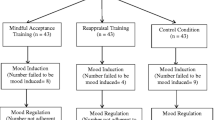Abstract
Background
There is evidence that various meditation practices reduce distress, but little is known about the mechanisms of frequently repeating a mantram—a spiritual word or phrase—on distress reduction. Mantram repetition is the portable practice of focusing attention frequently on a mantram throughout the day without a specific time, place, or posture.
Purpose
We examined the hypothesis of whether increases in positive reappraisal coping or distancing coping mediated the sustained decreases in anger found following a group-based mantram intervention that was designed to train attention and promote awareness of internal experiences.
Method
A secondary analysis was performed on data collected from a randomized controlled trial that compared a group-based mantram intervention (n = 46) to an attention-matched control (n = 47) in a community sample of human immunodeficiency virus-positive adults. Positive reappraisal and distancing coping were explored as potential mediators of anger reduction.
Results
Participants in the mantram intervention reported significant increases in positive reappraisal coping over the 5-week intervention period, whereas the control group reported decreases. Increases in positive reappraisal coping during the 5-week intervention period appear to mediate the effect of mantram on decreased anger at 22-week follow-up.
Conclusions
Findings suggest that a group-based mantram intervention may reduce anger by enhancing positive reappraisal coping.

Similar content being viewed by others
References
Grossman P, Niemann L, Schmidt S, Walach H. Mindfulness-based stress reduction and health benefits: a meta-analysis. J Psychosom Res. 2004;57:35–43.
Lane JD, Seskevich JE, Pieper CF. Brief meditation training can improve perceived stress and negative mood. Altern Ther. 2007;31(1):38–44.
Oman D, Hedberg J, Thoresen CE. Passage meditation reduces perceived stress in health professionals: a randomized, controlled trial. J Consult Clin Psychol 2006;74:714–9.
Speca M, Carlson LE, Goodey E, Angen M. A randomized, wait-list controlled clinical trial: the effect of a mindfulness meditation-based stress reduction program on mood and symptoms of stress in cancer outpatients. Psychosom Med. 2000;62:613–22.
Benson H. The relaxation response: its subjective and objective historical precedents and physiology. Trends Neurosci. 1983;6(7):281–4.
Benson H. The relaxation response and norepinephrine: a new study illuminates mechanisms. Aust J Clin Hypnother Hypn. 1989;10(2):91–6.
Benson H, Beary JF, Carol MP. The relaxation response. Psychiatry 1974;37(1):115–20.
Benson H, Greenwood MM, Klemchuk H. The relaxation response: psychophysiologic aspects and clinical applications. Psychiatry Med 1975;6(1–2):87–98.
Jacobs GD. Clinical applications of the relaxation response and mind-body interventions. J Altern Complement Med. 2001a;7(Suppl 1):S93–S101.
Jacobs GD. The physiology of mind-body interactions: the stress response and the relaxation response. J Altern Complement Med. 2001b;7(Suppl 1):S83–S92.
MacLean CR, Walton KG, Wenneberg SR, Levitsky DK, Mandarino JP, Waziri R, et al. Effects of the transcendental meditation program on adaptive mechanisms: changes in hormone levels and response to stress after 4 months of practice. Psychoneuroendocrinology. 1997;22(4):277–95.
Bormann JE, Becker S, Gershwin M, Kelly A, Pada L, Smith TL, Gifford AL. Relationship of frequent mantram repetition to emotional and spiritual well-being in healthcare workers. J Contin Educ Nurs. 2006a;37:218–24.
Bormann JE, Smith TL, Becker S, Gershwin M, Pada L, Grudzinski AH, Nurmi E. Efficacy of frequent mantram repetition on stress, quality of life, and spiritual well-being in veterans: a pilot study. J Holist Nurs. 2005;23:394–413.
Bormann JE, Smith TL, Shively M, Dellefield ME, Gifford AL. Self-monitoring of a stress reduction technique using wrist-worn counters. J Healthc Qual 2007;29(1):47–55.
Leserman J. HIV disease progression: depression, stress, and possible mechanisms. Biol Psychiatry. 2003;54:295–306.
Carrico AW, Ironson G, Antoni MH, Lechner SC, Durán RE, Kumar M, Schneiderman N. A path model of the effects of spirituality on depressive symptoms and 24-hour urinary-free cortisol in HIV-positive persons. J Psychosom Res. 2006b;61(1):51–8.
Antoni MH. Behavioural interventions and psychoneuroimmunology. In: Vedhara K, Irwin M, editors. Human psychoneuroimmunology. Oxford, UK: Oxford University Press; 2005.
Chesney MA, Chambers DB, Taylor JM, Johnson LM, Folkman S. Coping effectiveness training for men living with HIV: results from a randomized clinical trial testing a group-based intervention. Psychosom Med. 2003;65:1038–46.
Lechner SC, Antoni MH, Lydston D, LaPerriere A, Ishii M, Devieux J, et al. Cognitive-behavioral interventions improve quality of life in women with AIDS. J Psychosom Res. 2003;54:253–61.
Carrico AW, Antoni MH, Weaver KE, Lechner SC, Schneiderman N. Cognitive-behavioural stress management with HIV-positive homosexual men: mechanisms of sustained reductions in depressive symptoms. Chronic Illn. 2005;1:207–15.
Cruess DG, Antoni MH, Kumar M, Schneiderman N. Reductions in salivary cortisol are associated with mood improvement during relaxation training among HIV-seropositive men. J Behav Med. 2000;23(2):107–21.
Lutgendorf SK, Antoni MH, Ironson G, Klimas N. Cognitive behavioral stress management intervention decreases dysphoria and herpes simplex virus-type 2 titers in symptomatic HIV-seropositive gay men. J Consult Clin Psychol. 1997;65:23–31.
Lutgendorf SK, Antoni MH, Ironson G, Starr K, Costello N, Zuckerman M, Klimas N, Fletcher MA, Schneiderman N. Changes in cognitive coping skills and social support during cognitive behavioral stress management intervention and distress outcomes in symptomatic human immunodeficiency virus-seropositive gay men. Psychosom Med. 1998;60:204–14.
Carrico AW, Antoni MH, Durán RE, Ironson G, Penedo F, Fletcher MA, Klimas N, Schneiderman N. Reductions in depressed mood and denial coping during cognitive behavioral stress management with HIV-positive gay men treated with HAART. Annals Behav Med. 2006a;3(2):155–64.
Ironson G, Friedman A, Klimas N, Antoni M, Fletcher MA, LaPerriere A, Simoneau J, Schneiderman N. Distress, denial, and low adherence to behavioral interventions predict faster disease progression in gay men infected with human immunodeficiency virus. Int J Behav Med. 1994;1(1):90–105.
Teasdale JD, Moore RG, Hayhurst H, Pope M, Williams S, Segal ZV. Metacognitive awareness and prevention of relapse in depression: empirical evidence. J Consult Clin Psychol. 2002;70:275–87.
Kabat-Zinn J. Mindfulness-based interventions in context: past, present, and future. Clin Psychol Sci Pract. 2003;10:144–56.
Carrico AW, Gifford EV, Moos RH. Spirituality/religiosity promotes acceptance-based responding and twelve-step involvement. Drug Alcohol Depend 2007;89(1):66–73.
Gifford EV, Ritsher JB, McKellar JD, Moos RH. Acceptance and relationship context: a model of substance use disorder treatment outcome. Addiction. 2006;101:1167–77.
Easwaran E. The mantram handbook. 4th ed. Tomales, CA: Nilgiri; 2001.
Oman D, Driskill JD. Holy name repetition as a spiritual exercise and therapeutic technique. J Psychol Christ. 2003;22:5–19.
Bormann JE, Oman D. Mantram or holy name repetition: health benefits from a portable spiritual practice. In: Plante TG, Thoresen C, editors. Spirit, science and health: how the spiritual mind fuels physical wellness. Westport, CT: Praeger; 2007. p. 94–112.
Bormann JE, Oman D, Kemppainen JK, Becker S, Gershwin M, Kelly A. Mantram repetition for stress management in veterans and employees: a critical incident study. J Adv Nurs. 2006c;53:502–12.
Bormann JE, Gifford AL, Shively M, Smith TL, Redwine L, Kelly A, Becker S, Gershwin M, Bone P, Belding W. Effects of spiritual mantram repetition on HIV outcomes: a randomized controlled trial. J Behav Med. 2006b;29:359–76.
Broderick PC. Mindfulness and coping with dysphoric mood: contrasts with rumination and distraction. Cogn Ther Res. 2005;29:501–10.
Rusting CL, Nolen-Hoeksema S. Regulating responses to anger: effects of rumination and distraction on angry mood. J Pers Soc Psychol. 1998;74:790–803.
Antoni MH, Carrico AW, Durán RE, Spitzer S, Penedo F, Ironson G, et al. Randomized clinical trial of cognitive behavioral stress management on human immunodeficiency virus viral load in gay men treated with highly active antiretroviral therapy. Psychosom Med. 2006;68:143–51.
Bormann JE. Frequent, silent mantram repetition: a jacuzzi for the mind. Top Emerg Med 2005;27(2):163–6.
Folkman S, Lazarus RS. Age differences in stress and coping processes. Psychol Aging. 1987;7:171–84.
Folkman S, Lazarus RS. Ways of Coping Questionnaire. Palo Alto, CA: Consulting Psychologists Press; 1988.
London P, Spielberger C. Job stress, hassles, and medical risk. Am Health 1983;2:58–63, March.
Spielberger CD, Jacobs G, Russel S, Crane R. Assessment of anger: the state-trait anger scale. In: Butcher JN, Spielberger CD, editors. Advances in personality assessment, Vol 2. Hillsdale, NJ: Lawrence Erlbaum Associates; 1983. p. 159–87.
Enders CK. A primer on the use of modern missing-data methods in psychosomatic medicine research. Psychosom Med. 2006;68:427–36.
Baron RM, Kenny DA. The moderator-mediator distinction in social psychological research: conceptual, strategic, and statistical considerations. J Pers Soc Psychol. 1986;51:1173–82.
MacKinnon DP, Dwyer JH. Estimating mediated effects in prevention studies. Eval Rev. 1993;17:144–58.
Litt MD, Cooney NL, Morse P. Reactivity to alcohol-related stimuli in the laboratory and in the field: predictors of craving in treated alcoholics. Addiction. 2000;95:889–900.
Witkiewitz K, Marlatt GA. Relapse prevention for alcohol and drug problems: that was then, this is Tao. Am Psychol. 2004;59:224–35.
Acknowledgments
We acknowledge the contributions of Patricia Bone, BS, RN; Wendy Belding, MA for study recruitment and coordination; Ann Kelly, MSN, APRN and Sheryl Becker, MSN, RN as group co-faciliators; Madeline Gershwin, MA, RN and Laureen Pada, MSN/MBA, RN for quality control and also to Walter Boyle for technical support. Views expressed in this article are those of the authors and do not necessarily represent the official views of the Department of Veterans Affairs, the Government of the United States, or the National Center for Complementary and Alternative Medicine, National Institutes of Health.
Author information
Authors and Affiliations
Corresponding author
Additional information
This work was supported by a grant from the NIH/NCCAM (R21AT01159-01A) with additional support from the UCSD General Clinical Research Center (#1637), NIH/National Center for Research Resources (M01RR008), Ruth L. Kirschstein National Research Service Award (T32-MH019391), the San Diego Veterans Medical Research Foundation, and the Department of Veterans Affairs, VA San Diego Healthcare System, San Diego, CA.
Rights and permissions
About this article
Cite this article
Bormann, J.E., Carrico, A.W. Increases in Positive Reappraisal Coping During a Group-Based Mantram Intervention Mediate Sustained Reductions in Anger in HIV-Positive Persons. Int.J. Behav. Med. 16, 74–80 (2009). https://doi.org/10.1007/s12529-008-9007-3
Accepted:
Published:
Issue Date:
DOI: https://doi.org/10.1007/s12529-008-9007-3




